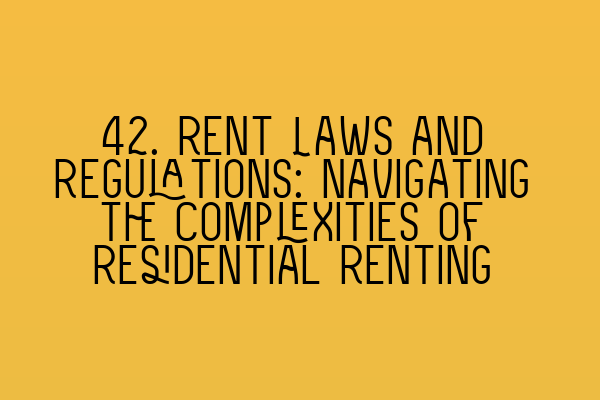Rent Laws and Regulations: Navigating the Complexities of Residential Renting
When it comes to renting a residential property, there are numerous laws and regulations that both tenants and landlords must abide by. Understanding these laws is crucial for a smooth and fair rental experience for all parties involved. In this article, we will explore the complexities of residential rent laws and regulations and provide guidance on navigating them effectively.
The Importance of Rent Laws
Rent laws serve as a legal framework to protect the rights and interests of both tenants and landlords. They ensure that rental agreements are fair and provide a clear set of guidelines on issues such as rent increases, tenancy contracts, security deposits, eviction procedures, and more.
By understanding and complying with these laws, tenants can ensure that they are treated fairly by their landlords, while landlords can protect their property and maintain a stable rental income. Being aware of rent laws also helps in resolving disputes and avoiding legal issues that can be costly and time-consuming.
Rent Law Categories
Rent laws can be broadly categorized into two main types:
- Statutory Rent Laws: These laws are enacted by the government at the state or national level to regulate various aspects of residential renting. They may cover issues such as rent control, tenant rights, security deposits, eviction procedures, and more.
- Common Law: Common law is a set of legal principles and court rulings that have been established over time. It governs various aspects of the landlord-tenant relationship, including property maintenance, habitability, lease agreements, and more.
Both statutory rent laws and common law together form the legal framework for residential renting.
Key Renting Regulations
Let’s explore some of the key regulations that both tenants and landlords should be familiar with:
Rent Control
Rent control laws vary from one jurisdiction to another. Some areas have strict rent control regulations that limit the amount landlords can increase rent, while others may have minimal or no rent control at all. It is essential for tenants to understand the rent control laws in their area to ensure they are not being charged unfairly high rent increases.
For landlords, staying updated with rent control regulations is crucial to avoid legal issues and potential penalties.
Tenant Rights
Tenant rights laws protect tenants from unfair treatment by landlords. These laws may cover areas such as privacy rights, access to essential services, habitable conditions, protection against discrimination, and more. Tenants should be aware of their rights and take necessary action in case of any violations.
Security Deposits
Security deposits are often required by landlords as a protection against potential damages or unpaid rent. However, there are regulations that govern how security deposits can be collected, stored, and returned. Both tenants and landlords should be aware of these regulations to ensure a fair and legal handling of security deposits.
Eviction Procedures
In situations where a tenant is violating the terms of the rental agreement or failing to pay rent, eviction may become necessary. However, landlords must follow specific eviction procedures as outlined by the law. These procedures include providing proper notice, following a fair process, and obtaining a court order if required.
Tenants should be aware of their eviction rights and take legal action if they believe they are being wrongfully evicted.
How to Navigate Rent Laws Effectively
Navigating the complexities of rent laws can be challenging, but there are several steps tenants and landlords can take to ensure compliance:
- Educate Yourself: Familiarize yourself with the rent laws in your jurisdiction. Research and understand the specific regulations that apply to your situation.
- Seek Professional Advice: If you have any doubts or questions about rent laws, consider consulting a solicitor who specializes in property law. They can provide you with expert advice and guidance tailored to your specific circumstances.
- Stay Updated: Rent laws may change over time, so it’s important to stay updated with any new regulations or amendments. Subscribe to relevant legal newsletters or websites to ensure you are aware of any changes that may affect you.
- Document Everything: Keep a record of all correspondence and agreements between you and your tenant or landlord. This documentation can be invaluable should a dispute arise.
- Communicate Openly: Maintain open and transparent communication with your tenant or landlord. This can help address any issues or concerns promptly and avoid misunderstandings.
By following these steps and adhering to the relevant rent laws, both tenants and landlords can create a harmonious and legally compliant rental environment.
In Conclusion
Rent laws and regulations play a vital role in ensuring a fair and balanced rental experience. It is essential for both tenants and landlords to understand and comply with these laws to protect their rights and interests. By educating themselves, seeking professional advice when needed, and staying updated, they can navigate the complexities of residential renting effectively.
If you’re preparing for the SQE 1 or SQE 2 exams, be sure to check out our related articles:
